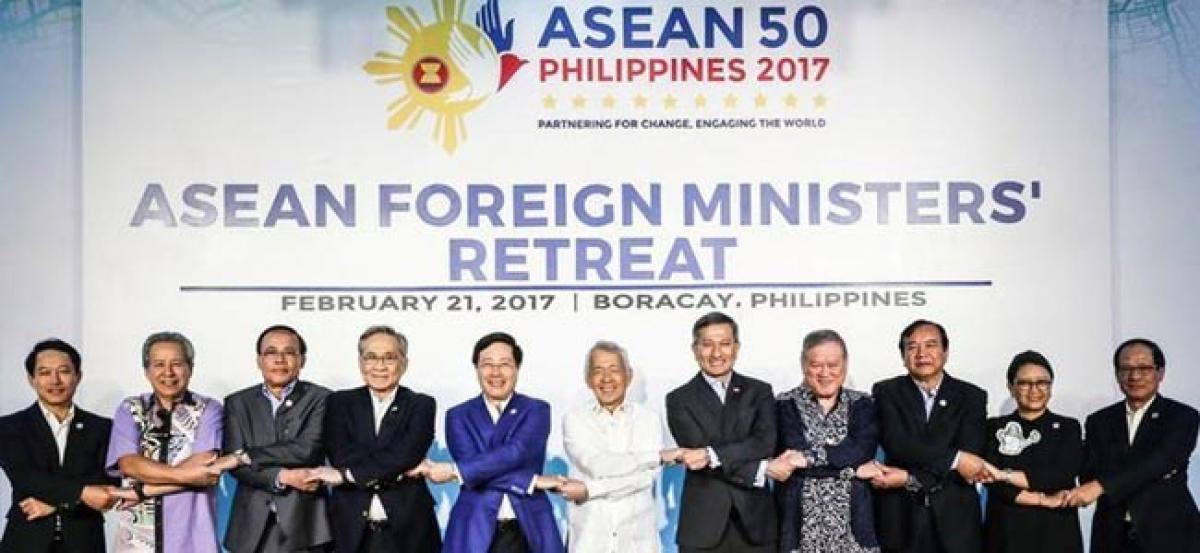Live
- Oppn misleading people, says PM
- Telangana CM Revanth Reddy Suggests Prioritizing the Most Needy for Indiramma Housing Scheme
- Telangana School Holiday: SFI Announces Bandh on November 30 Over Food Poisoning Cases
- NIT Warangal Library Trainee Recruitment: Last Date for Applications Tomorrow
- Singareni Recruitment 2024: Notification for 64 Internal Job Vacancies Application Deadline Announced
- A Teenager's Fight for Justice: Hyderabad Court Sentences Father to Life for Heinous Crime
- The Role of AI in Diagnostics, Treatment, and Patient Care
- Freshers’ Day Celebrations at Palem Agricultural Polytechnic College.
- Pearl Academy and Tech Mahindra Collaborate to Establish Makers Lab in Bengaluru
- “The Best Time to Start Retirement Planning is Now”, Says HDFC Life’s Latest Campaign
Just In

Southeast Asian countries see China\'s installation of weapons systems in the South China Sea as \"very unsettling\" and have urged dialogue to stop an escalation of \"recent developments\", the Philippines said on Tuesday.
BORACAY, PHILIPPINES: Southeast Asian countries see China's installation of weapons systems in the South China Sea as "very unsettling" and have urged dialogue to stop an escalation of "recent developments", the Philippines said on Tuesday.
The region's foreign ministers were unanimous in their concern over China's militarisation of its artificial islands, but were confident a framework for a code of maritime conduct could be agreed with Beijing by June, Philippine Foreign Secretary Perfecto Yasay said.
Yasay did not say what developments provoked the concern, but said the 10-member Association of South East Asian Nations (ASEAN) hoped China and the United States would ensure peace and stability.
He said demilitarisation would be a key component of any ASEAN-China code of conduct, but it was too soon to say whether Beijing's dismantling of its weapons installations would be a prerequisite.
"The ASEAN members have been unanimous in their expression of concern about what they see as a militarisation of the region," Yasay told reporters after a ministers' retreat on the Philippine island of Boracay.
Referring to China's manmade islands in the Spratly archipelago, Yasay said ASEAN countries had "noticed, very unsettlingly, that China has installed weapons systems in these facilities that they have established, and they have expressed strong concern about this."
With the Philippines chairing the bloc this year, Yasay's comments signal a rare, firm position by a grouping that often struggles to achieve consensus, due to its contrasting opinions on how to respond to China's assertiveness.
ASEAN's statements of concern often avoid mentioning China by name. Much is at stake from upsetting China, as ASEAN members, to varying extents, are under its influence and need its trade, investment and tourists.
TRUMP UNCERTAINTY
Regional geopolitics has become more uncertain since the election of U.S. President Donald Trump, particularly over his administration's role in a region strongly courted by Washington during the "pivot" of predecessor Barack Obama.
Friction between the United States and China over trade and territory under Trump has fuelled worry that the South China Sea could become a flashpoint.
China claims most of the waters, through which about $5 trillion in ship-borne trade passes every year. Brunei, Malaysia, the Philippines, Taiwan and Vietnam also have claims.
China on Friday completed war games with an aircraft carrier that unnerved neighbours. A day later the U.S. navy said its aircraft carrier strike group had started routine patrols in the South China Sea, a step China had warned against.
Yasay said ASEAN nations recognised policies under Trump were still evolving, but hoped they could be unveiled within a few months to provide a "more concrete and clearer picture", especially regarding China.
"We do not know the complete picture of what this foreign policy might be, insofar as its relationship with China is concerned. We're, however, hopeful that the policy that would come out will be positive."
Asked if China was committed to a set of rules on the South China Sea, he said Beijing had shown it was keen.
But all parties should ensure that the code, which has made little progress since the idea was agreed in 2002, needed to be legally "binding and enforceable", Yasay added.

© 2024 Hyderabad Media House Limited/The Hans India. All rights reserved. Powered by hocalwire.com







